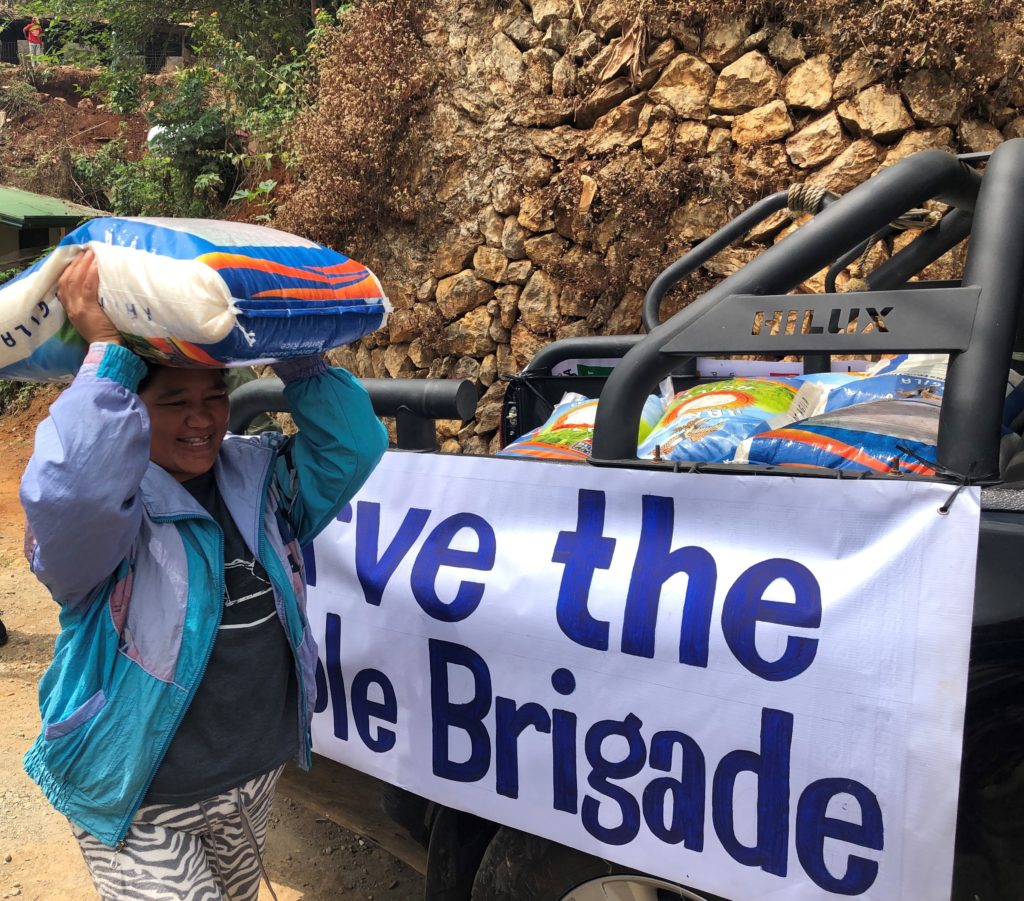
Sitio Piripin Bato, a sitio of barangay Pico, La Trinidad, Benguet adjoining Baguio City, is one of the beneficiaries for food relief of the Serve The People Brigade-Cordillera Disaster Response (STPB-CDR). First organized during the onslaught of typhoon “Pepeng” in 2009, the STPB-CDR was initiated by members of progressive organizations led by the Cordillera People’s Alliance (CPA) and volunteers from different non-government and civic organizations, institutions, schools and individuals from here and abroad.
In response to the Corona Virus Disease 2019 (Covid-19), the government implemented an Enhanced Community Quarantine (ECQ) and stringent social distancing measures over the entire Luzon on March 17, 2020, which has been extended to May 15, 2020 except for areas with no or low COVID infections. One of its provisions states that “a strict home quarantine shall be observed in all households; movement shall be limited to accessing basic necessities; provision for food and essential health services shall be regulated; and there will be heightened presence of uniformed personnel to enforce quarantine procedures.” (Office of the President, 2020)
The lockdown impacted sources of livelihood of families in sitio Piripin Bato where putting food on the table has become a real challenge. Fortunately, some are still able to sell fruits within the sitio and adjacent barangay of Pinget. For families raising hogs, looking for food sources for the pigs has also become difficult. They used to collect leftovers from restaurants or rejected vegetables at the trading post. But given the ECQ, they just opt to butcher their pigs and sell it for P200-P220 per kilogram. The majority with no immediate source of income depend on borrowing money from a kin or kailyan (townmate).
Piripin Bato thus became an area for relief service of STPB-CDR, which on April 7 delivered 25 kilograms of rice each for 45 households. These families shared that the relief was of great help in securing their food supply for the next two to three weeks. Priority beneficiaries were urban families relying on informal livelihoods (market vendors, jeepney drivers, musicians, construction workers) as well as the elderly, sick and recovering from sickness, persons with disability, and stranded students.
Many residents of Piripin Bato are natives of Saclit and Belwang in the municipality of Sadanga in Mountain Province who in 2000 began an exodus to Piripin Bato, occupying vacant lands in the sitio. They were joined by Ibaloi natives and other families from the province of Pangasinan. The Local Government Unit (LGU) of La Trinidad in the same year formally referred to them as squatters or informal settlers. Most of the land they occupied is claimed by the rich families of Minggeto, David, and Baltazar.
The natives of Sadanga left their original settlement to seek better work opportunities in the city. Farming as the main source of livelihood in their ili (community) was not enough to cater to their families’ basic needs. They left the ili but with no assurance of having a good quality of life in the city.
The Saclit and Belwang families who migrated to sitio Piripin Bato take on por dia (daily wage) work for survival. Some are farm workers receiving an average of P200-P250 per day. Others are seasonal construction workers being paid P350-P400 a day. Other sources of livelihood are ambulant vending and hog raising. There are also families supported by sons who are in the police and military.
Furthermore, these families do not have security of tenancy, as they face threats of demolition. The 4-hectare land claim of the Minggeto family are occupied by 230 families, 70 percent of whom are the Saclits. Thirty families are occupants of the land claims of the Baltazar family, most of whom are Belwang natives. These families have received notices of illegal structure and no building permit from the municipal government. Some informal settler associations in the community are standing up against threats of demolition. Negotiations are ongoing between the land claimants and the affected families.
Classified as informal settlers, these families cannot access electricity and water services from the local government, as they do not have the required building permits and land titles. Families thus resort to using candles or kerosene gas as a source of light at nighttime. They also rely on water delivery service, which costs P45-P50 for a 200-liter drum of water.
Sadanga is a 5th class municipality, which the government defines as having obtained “an average annual income of one million pesos or more but less than three million pesos” (DILG-CAR, 2020). Municipalities under this classification are priority beneficiaries of government programs and services.
The Department of Environment and Natural Resources (DENR) approved the alienable and disposable land classification of Sadanga municipality in 1987, without a proper consultation process with the people. Under this classification, they are deemed squatters on the land they inherited from their ancestors (Cordillera Almanac, 1999). They are considered informal settlers even on the lands they have been occupying since time immemorial.
***
References cited:
Cordillera Almanac. (1999). “Municipality of Sadanga Profile”. In DILG-CAR official website. <https://dilgcar.com/index.php/2015-07-10-09-39-31/municipality-of-sadanga>
DILG-CAR. (2020). Municipality of Sadanga Quick Facts. <https://dilgcar.com/index.php/2015-07-10-09-39-31/municipality-of-sadanga>
Office of the President. (2020). Memorandum from the Executive Secretary: Community Quarantine Over the Entire Luzon And Further Guidelines for the Management of the Coronavirus Disease 2019 (Covid-19) Situation. <https://www.officialgazette.gov.ph/downloads/2020/03mar/20200316-MEMOR ANDUM-FROM-ES-RRD.pdf>
Office of the President. (2020). Executive Order No. 249, Providing for a New Income Classification of Provinces, Cities and Municipalities, and for other purposes, July 25, 1987. <https://www.officialgazette.gov.ph/1987/07/25/executive-order-no-249-s-1987/>
